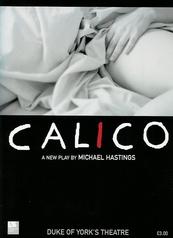Calico
Michael Hastings' has written a fascinating play that examines a young woman's descent into madness and asks if her far from conventional family was the cause of her growing insanity?
The young woman is Lucia Joyce, the daughter of the Irish modernist writer James Joyce. Sadly we have little in the way of autobiographical information about Lucia. The Joyce Estate has apparently destroyed all of Lucia's diaries, manuscripts and correspondence with her father, and so all we know about Lucia are recollections from friends and family members. One of those family friends who established a close relationship with Lucia was that other great Irish modernist writer, Samuel Beckett. This has opened the way for much speculation, and whatever reasons the Joyce Estate has for wishing to expunge Lucia's own accounts of her life, their actions in doing so have merely poured petrol upon the fires of sexual intrigue.
The play opens with Lucia working with her father upon his novel 'Finnegan's Wake', where they are playing at inventing words on which they craft new meanings. Lucia asks her father what he means by "commence insects", to which he responds, "commit incest". This is the closest that the play comes to expressing Michael Hastings' personal belief that Joyce had - on at least one occasion - sexually abused his daughter. In the programme notes Hastings delves into this possible paternal incest in far greater detail, though in the play all further incestuous claims are now between brother and sister.
What makes Hastings' play so fascinating is not the possible charge of incest, which remains unproved, but the peculiar relationships within the Joyce household, and the anguish absurdity of their family life. James Joyce seems happy to turn his back on conventional society for the sake of his writing, whilst his 'wife' Nora grows increasingly obsessed with the notion of respectability. We learn of their salacious hidden secrets; secrets that Lucia spews up around the dining table during her uncontrollable fits of obscene expletives. Lucia, seemingly aware that she is losing her mind, escapes her turmoil by fantasising that she and Beckett are married and have a child. Initially she appears grateful that Beckett indulges her in playing the game of being "Mr and Mrs Beckett", thus allowing her to pretend at 'normality' before her insanity finally overwhelms her. And Giorgio, Lucia's brother who mistakenly believes he has a great operatic voice, has moved his headstrong American mistress into the Joyce household.
The tragic elements of this story become more palpable due to these moments of hilarious absurdities. The scene in which Lucia pins her mother down to the floor while reading out loud one of her mother's sexually explicit letters is both terribly funny and incredibly heart breaking, as is the scene where Nora rages about the families chaotic car journey to a mental asylum. What comes to the fore is the tribulation of an eccentric but loving family trying to cope with oncoming insanity.
The acting is phenomenal throughout, but two actors in particular shine, Imelda Staunton and Romola Garai. Imelda Staunton as the no-nonsense, feisty, proud Nora, who struggles to protect her daughter and also her family's reputation. One is never quite sure if Nora's pity is for her daughter or herself, whichever the case, she looks increasingly diminished. Romola Garai gives such a seasoned performance as Lucile, it is difficult to believe this is her first professional stage appearance. She explodes with fits and twitches of nervous energy, and I found myself moved with the dignity she brings to her character's drift towards madness.
So robust is Garai's performance that the production is always about her relationship with Beckett, rather than Beckett's relationship with her. I felt sympathy for Daniel Weyman, who plays the role of Samuel Beckett. Despite the gentleness and compassion he brought to his portrayal, he paled before Garai's Lucia. In the final scene of the play, when Becket visits Lucia inside the mental asylum, it is the lost look inside Lucia's eyes as she reaches out towards Beckett that remains in the mind.
Edward Hall's masterfully captures both the tragic and comic elements of Hastings' drama.
Alan Bird
What other critics had to say.....
NICOLAS DE JONGH for THE EVENING STANDARD says, "Remarkable new play." PAUL TAYLOR for THE INDEPENDENT says, "Trashy docu-drama." MICHAEL BILLINGTON for THE GUARDIAN says, "Elegant production also contains good performances.." CHARLES SPENCER for THE DAILY TELEGRAPH says, "What a disappointment Calico proves." BENEDICT NIGHTINGALE for THE TIMES says, "The play's problem is its uncertainty of focus and tone."
External links to full reviews from popular press
The Independent
The Guardian
Daily Telegraph
The Times
Originally published on
